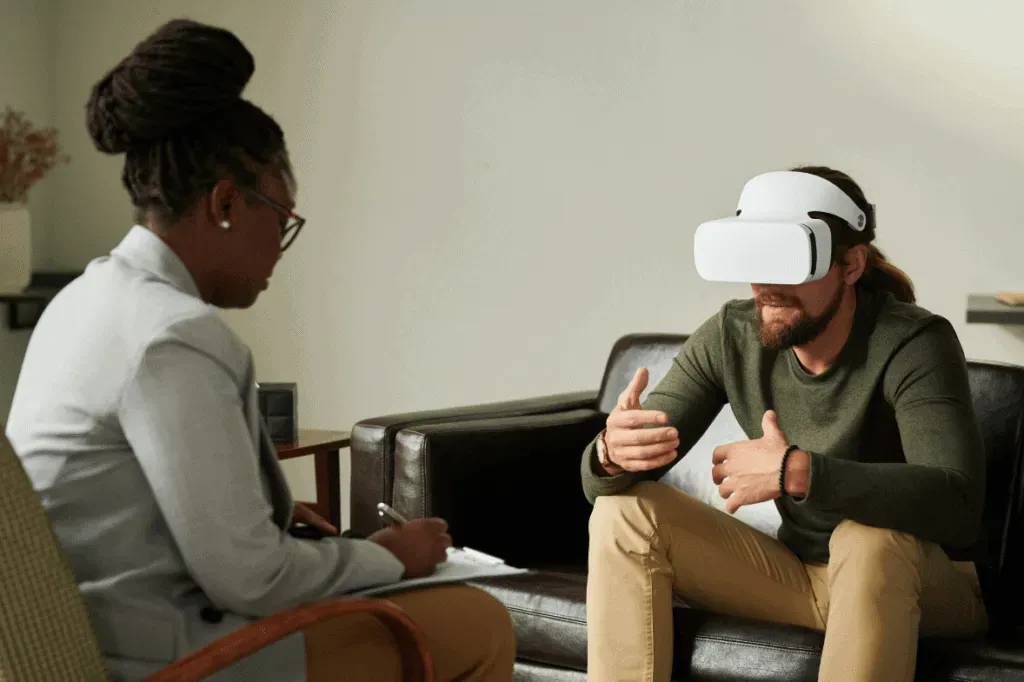Video games therapy is emerging as a groundbreaking method for enhancing mental health, particularly in children affected by trauma and stress. By incorporating interactive technology such as Minecraft into the therapeutic process, therapists are finding that these engaging platforms can serve as powerful tools for expression and healing. Studies show that video games for healing provide a unique avenue for promoting mental health for children, allowing them to explore their feelings in a safe, controlled environment. Therapeutic play through gaming not only fosters creativity but also aids in child development through gaming experiences that resonate with young players. As more practitioners recognize the benefits of this modern approach, it opens a world of possibilities for supporting emotional well-being in children facing various challenges.
The innovative use of digital gaming as a therapeutic intervention is transforming the landscape of child psychology. Known as gaming therapy, this approach utilizes interactive environments such as Minecraft to foster emotional resilience and provide children with an outlet for self-expression. By engaging in these virtual worlds, young people can navigate their emotions and experiences, enhancing their emotional intelligence. The concept of play, deeply embedded in childhood development, is now being enriched through technology, encouraging a new way of connecting with youth and understanding their needs. As this practice continues to evolve, it emphasizes the vital role that play has in psychological growth and healing.
Understanding Video Games Therapy as a Healing Tool
Video games therapy has emerged as an innovative approach in psychotherapy, particularly for children dealing with trauma and mental health issues. With a growing recognition among therapists that traditional therapeutic methods may not resonate with the digital generation, video games like Minecraft are being integrated into treatment plans. These games offer a unique avenue for self-expression and creativity, enabling children to engage in therapeutic play that is not only enjoyable but also effective for mental health support.
By creating immersive environments where children can build their own worlds, play collaboratively, and explore their emotions, video games therapy taps into the natural tendencies of young people. According to experts, such interactive and creative gaming experiences can foster communication and self-discovery. Moreover, as children navigate challenges within these virtual landscapes, they often reflect on their real-life struggles, leading to valuable psychological insights.
The Role of Minecraft in Child Development
Minecraft, in particular, has become a staple in therapeutic settings due to its engaging gameplay and open-ended nature. This block-building game allows children to construct complex structures and explore various scenarios, making it a powerful tool for encouraging critical thinking and creativity. Many therapists have noted that when children play Minecraft, they are not just playing a game—they are developing vital skills such as problem-solving, collaboration, and emotional regulation, which are crucial for their overall development.
Furthermore, the social aspect of Minecraft, where children can connect and collaborate with peers from different backgrounds, offers a support system that is often lacking in their daily lives. For those dealing with trauma, such as Ukrainian children affected by war, Minecraft serves as a virtual haven where they can express their experiences and emotions in a safe and constructive way. It gives them a platform to share their stories, reflect on their feelings, and find solace amidst the chaos.
Therapeutic Play: The Intersection of Gaming and Mental Health
Therapeutic play is an essential component of child development and mental health support, allowing children to express themselves in ways that verbal communication may inhibit. Through video games, therapists can observe children as they interact with their electronic environments, gaining insights into their emotional states and coping mechanisms. This type of play therapy is particularly beneficial for vulnerable populations, including those affected by trauma or discrimination, as it allows them to confront their experiences through a transformative lens.
By engaging in video games therapy, children can utilize gaming elements to articulate their fears, hopes, and challenges. The immersive nature of these games encourages exploration and experimentation, making it easier for young clients to explore their internal struggles in a therapeutic context. Such forms of therapeutic play not only contribute to improved emotional well-being but also foster resilience and coping strategies essential for child development.
Collaborative Healing through Gaming
The collaborative nature of multiplayer games, such as Minecraft, plays a pivotal role in the therapeutic process. When children engage with one another in these virtual spaces, they develop a sense of community and support that can be invaluable for their mental health. This collaboration often leads to shared experiences that can reinforce relationships and counter feelings of isolation, particularly among children who have faced adversity.
Through guided sessions with therapists, children can participate in projects that require teamwork while also addressing personal experiences in a safe environment. These cooperative activities allow them to express their emotions and experiences in a non-threatening way, contributing to a holistic healing process. As they interact with their peers and work towards common goals in the game, these young players not only enjoy the fun of gaming but also foster important social skills and emotional intelligence.
Impact of Video Games on Emotional Well-being
The integration of video games into therapy has shown significant promise for enhancing emotional well-being among children. Digital environments provide safe spaces for children to explore their identities and emotions without the constraints of traditional therapeutic settings. Therapists utilizing games can observe behaviors that reveal underlying emotional issues, enabling them to tailor interventions effectively. For many children, the approach to mental health becomes less intimidating when they are actively engaged in a familiar medium like gaming.
Additionally, video games can evoke a range of emotions, from joy to frustration, allowing children to process their feelings in real time. Whether through triumphs in gameplay or collaboration with peers, these experiences help children articulate their emotional responses, ultimately leading to greater self-awareness and understanding. As therapists harness these outcomes through structured gaming sessions, the question of how video games contribute to emotional healing becomes increasingly clear.
Expanding the Reach of Video Games for Healing
As the field of therapy continues to evolve, the applications of video games for healing have expanded beyond traditional childhood issues. Therapists are now exploring how gaming can aid in addressing various mental health challenges faced by adolescents and adults. This evolution signifies a shift in the perception of video games, revealing their potential as more than just a form of entertainment but as tools for significant therapeutic intervention.
By opening the doors to video game therapy for older age groups, practitioners can leverage the familiarity and comfort that gaming provides. Couples, for instance, are beginning to explore Minecraft as a platform for relationship counseling, using it as a bridge to communicate and reconnect. The therapeutic techniques learned in treating children can be applied to various demographics, paving the way for a more inclusive approach to mental health support through the lens of gaming.
The Therapeutic Benefits of Gaming Communities
The emergence of supportive communities within video games also plays a crucial role in promoting mental health. Children who may feel marginalized in their daily lives can find acceptance and camaraderie within gaming communities. This acceptance fosters resilience, allowing them to navigate challenges both online and offline. Building friendships in these microcosmic worlds helps children learn how to function effectively in social dynamics, which can translate into real-world interactions.
In addition, these gaming communities can serve as forums for sharing personal stories and strategies for coping with difficult situations. The anonymous nature of many online platforms allows children to express themselves freely, leading to a form of therapeutic discourse that can be incredibly beneficial. Just as therapists facilitate discussions around feelings, gaming communities can encourage shared storytelling, thus enhancing emotional catharsis and contributing to the overall mental health of their members.
Exploring the Future of Video Game Therapy
The potential for video games therapy is vast, particularly as technology continues to advance. Virtual reality and augmented reality are on the rise, providing new avenues for immersive healing experiences. As therapists stay informed on these emerging technologies, the opportunity to evolve traditional therapy to include digital play becomes increasingly profound. The prospect of leveraging these innovative platforms signifies a transformative shift in the realms of mental health and childhood development.
Moreover, research into the psychological effects of video games continues to deepen, shedding light on how different types of gameplay can aid healing processes in targeted populations. As these discoveries unfold, therapists will be better equipped to incorporate elements of gaming into their practice, ensuring that interventions are tailored to the unique needs of each child. Looking forward, the integration of video games as a therapeutic tool may not just bridge gaps in communication but redefine our understanding of psychological well-being in the digital age.
The Importance of Parental Involvement in Gaming Therapy
In the context of child mental health, parental involvement in video game therapy is critical for maximizing its benefits. Parents play an essential role in mediating their children’s gaming experiences and can help facilitate engaging therapeutic sessions. By being present during gaming therapy, parents can better understand the therapeutic process and the emotions being expressed during gameplay. This involvement allows for constructive discussions about emotions and challenges at home, fostering a supportive environment for healing.
Additionally, parents can participate actively in this journey by joining gaming sessions or engaging in conversations about the games their children are playing. This collaboration not only strengthens family bonds but also encourages parents to incorporate their children’s interests into their support strategies. As families navigate the world of video games together, they cultivate open lines of communication, leading to deeper understanding and empathy in addressing the mental health needs of their children.
Frequently Asked Questions
What is video games therapy and how can it help with mental health for children?
Video games therapy utilizes video games as a therapeutic tool to support mental health for children. It allows therapists to engage with young clients in a relatable way, helping to build rapport and facilitate expression of emotions. By playing games like Minecraft, children can explore their feelings, develop coping skills, and improve their overall mental well-being.
How does Minecraft therapy promote child development through gaming?
Minecraft therapy fosters child development through gaming by encouraging creativity, problem-solving, and social interaction. The game’s open-world format allows children to express themselves, collaborate with peers, and face challenges in a safe environment, promoting cognitive and emotional growth.
Can video games for healing really assist traumatized children?
Yes, video games for healing can assist traumatized children by providing an outlet for expression and exploration of trauma in a controlled setting. Games like Minecraft allow children to express their emotions and experiences indirectly, which can be less intimidating than traditional talk therapy.
What role does therapeutic play have in video games therapy?
Therapeutic play is central to video games therapy as it blends play and therapy techniques to foster emotional exploration and healing. Video games create immersive environments where children can safely explore their thoughts and feelings while engaging in playful activities, enhancing the therapeutic process.
How are therapists integrating Minecraft and other video games into their practice?
Therapists are integrating Minecraft and other video games into their practice by creating controlled environments where children can engage in game-based activities. They facilitate sessions where children can construct their own worlds, explore their feelings, and interact with therapists in a playful manner, which can reveal insights into their emotional state.
Is video games therapy effective for children with special educational needs?
Video games therapy is often very effective for children with special educational needs. The engaging nature of video games allows for tailored experiences that accommodate various cognitive and emotional challenges, making it easier for these children to connect and express themselves in therapy.
What benefits do children gain from using video games for therapy during challenging times?
During challenging times, children gain multiple benefits from using video games for therapy, including a safe space to express emotions, skills in problem-solving, and opportunities for social connection. Games like Minecraft can serve as a medium for children to cope with stress, share experiences with peers, and engage in therapeutic play.
Why are more therapists advocating for video game therapy methods?
More therapists are advocating for video game therapy methods because they recognize the potential of games to engage children effectively. The flexible and creative nature of games promotes openness and emotional expression, making therapy more relatable and impactful for a generation raised with technology.
How can parents support their children who are involved in video games therapy?
Parents can support their children involved in video games therapy by showing interest in their gaming experiences, communicating openly about feelings, and encouraging participation in therapeutic sessions. Establishing a balance between gaming and other activities is also important to ensure a holistic approach to their child’s mental health.
Are there any success stories related to video games therapy in different regions?
Yes, there are numerous success stories related to video games therapy across various regions, especially in contexts like supporting children affected by trauma from conflict. For instance, initiatives utilizing Minecraft for Ukrainian children affected by war have shown positive results in building community, fostering expression, and promoting emotional healing.
| Aspect | Details |
|---|---|
| Video Games in Therapy | Therapists are now using video games, especially Minecraft, as therapeutic tools for mental health support, particularly for vulnerable children. |
| Case Study: Oleksii Sukhorukov | After the Russian invasion of Ukraine, Sukhorukov transformed from entertainment to psychology, utilizing gaming to develop a supportive online space for traumatized children. |
| Importance of Play | Play has long been integral to child therapy, and video games are now seen as a modern extension of these therapeutic practices. |
| Benefits of Minecraft Therapy | Minecraft allows children to express themselves, build relationships, and tackle underlying emotional issues in a safe, engaging environment. |
| Therapeutic Approaches | Therapists adopt both directive and non-directive approaches, facilitating sessions that mirror the child’s interests and emotional needs. |
| Growing Interest in Video Game Therapy | The field is expanding, with innovative projects being implemented globally to support children’s mental health through gaming. |
| Future of Therapy | Therapy using video games is not limited to children; there is potential for wider applications among adults and couples. |
Summary
Video games therapy is revolutionizing the way therapists interact with vulnerable children. By embracing the ideas and tools inherent in video gaming, therapists can foster emotional growth and provide critical mental health support. Through games like Minecraft, children are not only granted a unique outlet for self-expression, but also a means to navigate their emotional landscapes amidst trauma. As research and practice in this area grow, it is clear that video games therapy presents transformative opportunities for healing and connection.



